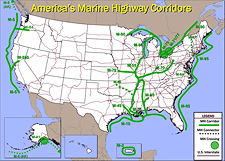As part of America’s Marine Highway Program, U.S. Transportation Secretary Ray LaHood in August announced a special designation for the Columbia, Willamette and Snake rivers as key “marine highway” corridors for the nation. This new federal initiative aims to move more cargo by water rather than on crowded highways.
“Making better use of our rivers and coastal routes offers an intelligent way to relieve some of the biggest challenges we face in transportation – congestion on our roads, climate change, fossil fuel energy use and soaring road maintenance costs,” said Secretary LaHood. “There is no better time for us to improve the use of our rivers and coasts for transportation.”
Being designated as a marine highway corridor means regional projects can compete for future Marine Highway federal funding and other forms of federal assistance. Locally, achieving the designation also reinforces the city of Portland and Multnomah County’s Climate Action Strategy which supports moving freight in the most energy-efficient and sustainable mode – which is by water. The river system provides a proven, cost-effective, environmentally friendly transportation alternative to the road and rail network.
The marine highway concept includes naming the corridors much like traditional interstate highways and freeways on land. For example, the M-84 Corridor includes the Columbia, Willamette and Snake rivers, connecting commercial navigation channels, ports, and harbors, including the Portland Harbor. It spans Oregon, Washington and Idaho from Astoria, Ore. to Lewiston, Idaho. In Astoria, it connects to the M-5 Corridor, which runs the length of the U.S. West Coast.
The U.S. Maritime Administration chose projects and initiatives from 35 applications submitted by ports and local transportation agencies. The Port of Portland, the Pacific Northwest Waterways Association, and other stakeholders on the river system had advocated for the designation.
“It is gratifying to see the importance of our river system recognized at the highest levels as vitally important for freight transportation and international trade,” said Sam Ruda, director of marine and industrial development for the Port of Portland. “Together with the West Coast Corridor, we will continue to realize the potential of our marine highways to move cargo in efficient, cost-effective and environmentally conscious ways.”
Related Link:
America’s Marine Highway Corridors
Maritime Administration (MARAD)

